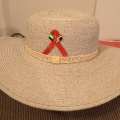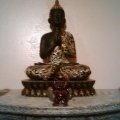Monks, wisdom and our freedom
 Jeroen
Not all those who wander are lostNetherlands Veteran
Jeroen
Not all those who wander are lostNetherlands Veteran
It seems to me that monks while they get the space and time to pursue the path, also give up quite a lot of freedom in how to think. They are given books to read, told to see the authors as fully enlightened beings, get wise words poured in as dhamma talks. If you are not careful you become conditioned, and rather than developing your own wisdom you become a parrot.
I am reminded of Ajahn Chah’s dhamma talk, where he explained that he did very little reading and memorising but instead spent time studying his own heart, the seat of his emotions and thinking. It is a way to become more free, more wise from what you yourself are, rather than copying from and conforming to what others tell you. It depends on what is expected of you by your teachers.
As independent buddhists we have a lot of freedom, so we can choose which path to follow. We can follow a tradition like the Tibetan Gelugpa school, which puts a lot of emphasis on learning, or we can choose to be more moderate in our consumption of texts and instead do more practice.
I spent some time with the Gelugpa, and found that their way of stressing learning and recall did not really conform with my understanding of the path. They liked to memorise lists, I prefer to take a text which contains real wisdom as well as inspiration and put it into practice at my own speed. Reading becomes a meditative endeavour, a savouring and considering of the words, and each book or text carefully chosen.









Comments
Sadhu !
Partially why I'm choosing to try to eventually ordain in Thich Nhat Hanhs Zen or Order of Interbeing. Dogma and attachment to views (even Buddhist ones) goes against the training and we are free to investigate all teachings ourselves and are not limited to Theravada or Mahayana.
In my view freedom is indeed one of the highest values, an asset that should be prized.
But, freedom is like water. Water needs a container, a vessel for giving it form and function. Otherwise, water has no shape. It is chaotic. In that sense freedom, like water, without discipline and concentration, is quite meaningless.
You have freedom, but then the question is, what do you want to do with it? It seems to me in our modern age we have given up the true depth of being human in a lot of ways. In exchange for distractions and knick-knacks. There are some plusses - the intellect is less encumbered and we can come to our own conclusions. But this is at a tremendous cost. We need to pick up the fragmented pieces of modernity and make the best use of our life as it currently exists in society, imho. The how of this is what troubles me. But I have faith in humanity that it can rekindle a spiritual spark and make the best use of our current climate.
It's all a paradox in the end. And, paradox in my view has many more steps than people realize....
Yes that is definitely part of it. Learning by memorisation can very easily turn into a rigid attachment to views, and that decreases ones freedom. The whole question of orthodoxy and maintaining a uniform point of view across an organisation also comes into it as soon as you try and present as a single body, though.
I think that's why I like the emphasis being on the work of changing the conditions that give rise to dhukka. When we cling to our views it makes it that much harder to see a brother or sisters side of things even during a friendly debate.
As is pointed out constantly and here often @Federica reminds us that Buddha taught how to relieve our suffering and not getting caught up in views is a big part of that.
Great post @Dimmesdale
I too have faith in-humanity, a new spark. A spiritual flame.

Manjushri loaned me her sword to start a barbecue ... I now haz to cook myself ...
I also like what @Dimmesdale said. We need some shape and direction or we just become too loose and spread out. It seems kind of like the paradox of choice, give us too many options and it makes things harder on us. Or often it is easier to be creative within a situation with constraints rather than a wide open situation.
Also, as much as I, myself really like the ability to look around and think for myself. A tradition passed down largely with people like me simply wouldn't last very long.
Ah ha, you spotted the flaw in the uniformed sangha and pious robot cult followers. Heaven and Wo-Manjushri save the gentlemans club of original home leavers (Sangha). Oh somebody did ...
Heaven and Wo-Manjushri save the gentlemans club of original home leavers (Sangha). Oh somebody did ...
During his legendary lifetime, the Buddha changed and modified the Dharma. I have a feeling the 10 commandments may also have been re-chiseled a few times.
https://en.m.wikipedia.org/wiki/Ten_Commandments
The important thing is the ability to recognise the fluidity in our being/the genuine and separate the emptying from the temporary forms ...
Freedom always has its limits... financial and practical and familial constraints on what the mind can imagine, and that in itself is also a limit. You could try and express it mathematically, to gain an increased understanding.
But we are also subject to a range of conditionings, all kinds of things inserting itself into our beliefs. It is not static. Even the fact that every morning we are proved to have a body when we come up from sleep is a form of bringing us back to the world. Then every book that you read is a little bit a conditioning.